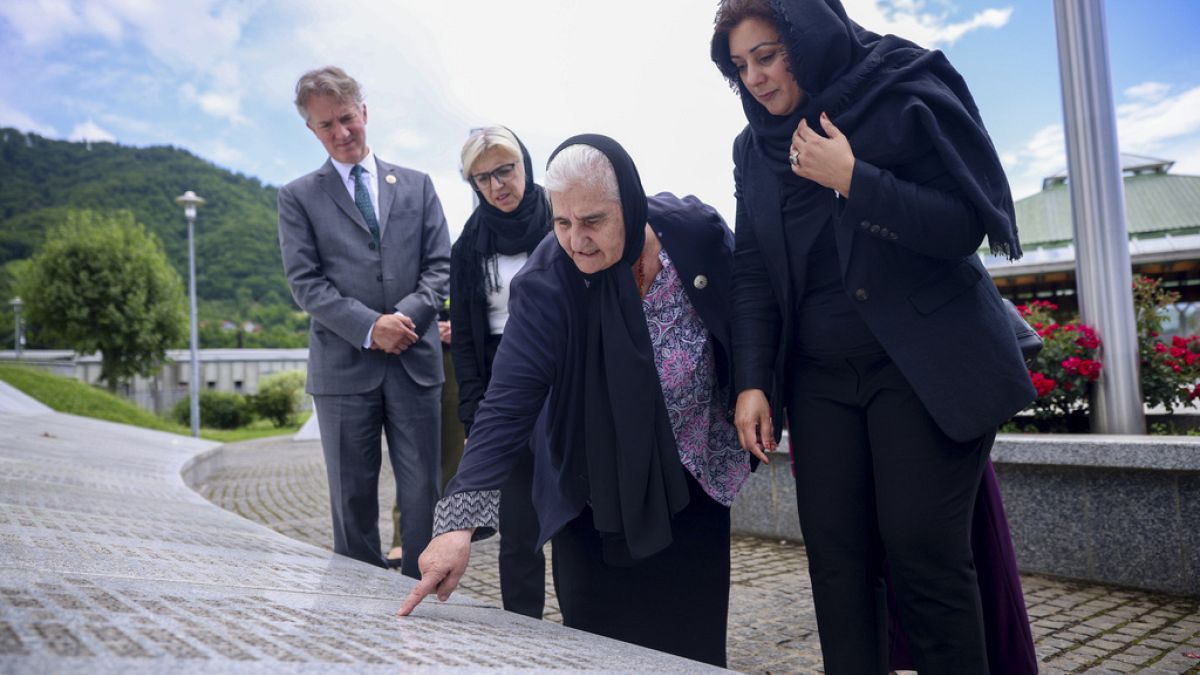
The leader of Bosnia and Herzegovina’s Serb-majority entity, Milorad Dodik, repeated his threat to withdraw from the Balkan country on Wednesday, a day before a UN vote on establishing an annual day to commemorate the 1995 genocide of more than 8,000 Bosniaks in Srebrenica.
Relatives of the victims, meanwhile, said that the vote would mark a historic day in ensuring that the deaths cannot be denied or forgotten.
The proposed UN resolution sponsored by Germany and Rwanda has been supported by the Bosniaks but has sparked protests and a lobbying campaign against it by the Bosnian Serb Dodik and the populist president of neighbouring Serbia, Aleksandar Vučić.
The two leaders say the resolution would brand “all Serbs as genocidal”, although the draft does not explicitly mention Serbs as culprits. Both Serbia and Bosnian Serbs have denied that genocide happened in Srebrenica, although this has been established by two UN courts.
Bosnia has a law against genocide denial introduced in 2021 by the former High Representative, Valentin Inzko.
‘We expect a fair decision’
For those who lost their loved ones in the massacre, any denial of the scope of the crime has meant more grief. This is why the UN vote “means a lot” for victims, truth and justice, said Munira Subašić from the Mothers of Srebrenica group.
“People who live in lies, who don’t know the truth, they will need this UN resolution more than we do,” Subašić said, adding that she was referring to “genocide deniers” among Bosnian Serbs and in Serbia. “They will not be able to glorify war criminals any more.”
“We expect a fair decision (on Thursday), a decision that will tell us, the families, that there is justice in the world, that there is humanity,” added Nura Begović, who also lost several family members in Srebrenica.
On 11 July 1995, Bosnian Serbs overran a UN-protected safe area in Srebrenica. They separated at least 8,000 Bosniak men and boys from their wives, mothers and sisters and slaughtered them.
The 193-member UN General Assembly plans to debate the resolution on Thursday, followed by a vote. Serbia has the support of their allies Russia and China, while the resolution is supported by the US, France, Italy and most other Western states.
Dodik, president of the Republika Srpska, a Serb-majority administrative unit comprising about half of Bosnia, said on the social media platform X that the UN resolution is being forced on the country by supporters of Bosniaks and will split it up. He said his government could formally propose a separation on Thursday.
“Bosnia and Herzegovina has reached its end, or to be more precise, it was brought to an end by those who swore to it,” Dodik said on X. “All that remains is for us all to make an effort to be good neighbours and to part in peace.”
Dodik has made several such threats in the past to have the Serb-majority entity secede from Bosnia and possibly join with neighbouring Serbia. He and some other Bosnian Serb officials are under US, UK, German and other sanctions partly for jeopardising a US-brokered peace plan that ended Bosnia’s 1992-95 war.
The Srebrenica killings were the bloody culmination of the war, which came after the breakup of Yugoslavia unleashed nationalist passions and territorial ambitions that set Bosnian Serbs against the country’s two other main ethnic populations, Croats and Bosniaks.
The International Court of Justice, the UN’s highest tribunal, determined in 2007 that the acts committed in Srebrenica constituted genocide, and the court’s ruling is included in the draft resolution. It was Europe’s first genocide since the Holocaust in World War II.
Campaigning for ‘no’
Serbia’s President Vučić and his government have been campaigning both at the UN and among developing countries to win support for a “no” vote. Approval requires a majority of those voting.
In a massive campaign in both Serbia and the Serb-controlled half of Bosnia, organisers have put up billboards and video beams reading “Serbs are not genocidal people”.
Vučić and Dodik, both pro-Russian politicians, have also argued against the resolution, saying it raises the possibility of having to pay war damages.
The draft resolution condemns “without reservation any denial of the Srebrenica genocide as a historical event.” It also “condemns without reservation actions that glorify those convicted of war crimes, crimes against humanity and genocide by international courts, including those responsible for the Srebrenica genocide.”
Bosnian Serb wartime political leader Radovan Karadžić and his military commander, Ratko Mladić, were both convicted of genocide in Srebrenica by a special UN war crimes tribunal, the ICTY.
In all, the tribunal and courts in the Balkans have sentenced close to 50 Bosnian Serb wartime officials to lengthy prison terms for their actions during the 1992-1995 conflict.





